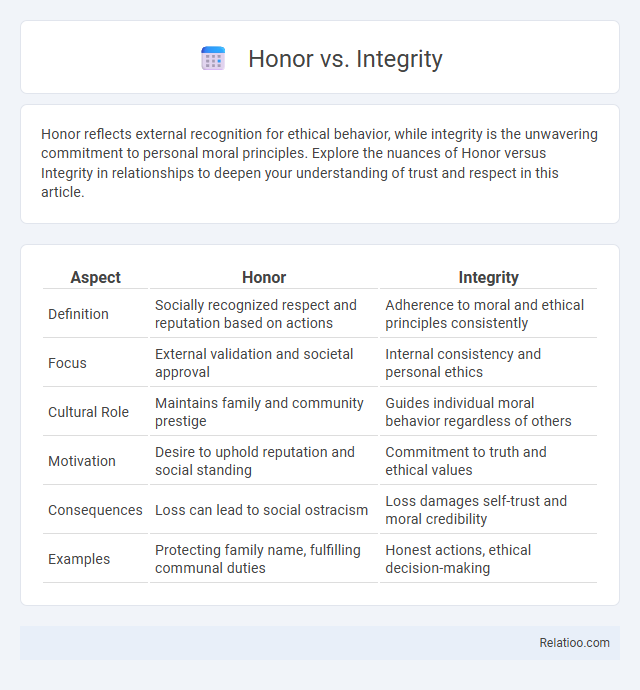Honor reflects external recognition for ethical behavior, while integrity is the unwavering commitment to personal moral principles. Explore the nuances of Honor versus Integrity in relationships to deepen your understanding of trust and respect in this article.
Table of Comparison
| Aspect | Honor | Integrity |
|---|---|---|
| Definition | Socially recognized respect and reputation based on actions | Adherence to moral and ethical principles consistently |
| Focus | External validation and societal approval | Internal consistency and personal ethics |
| Cultural Role | Maintains family and community prestige | Guides individual moral behavior regardless of others |
| Motivation | Desire to uphold reputation and social standing | Commitment to truth and ethical values |
| Consequences | Loss can lead to social ostracism | Loss damages self-trust and moral credibility |
| Examples | Protecting family name, fulfilling communal duties | Honest actions, ethical decision-making |
Defining Honor and Integrity
Honor is a personal code of ethics reflecting your commitment to moral principles and respect from others, while integrity involves consistently adhering to those ethical standards regardless of external circumstances. Both concepts emphasize authenticity and trustworthiness, but honor often relates to social recognition, whereas integrity is about inner consistency and honesty. Your reputation is shaped by how well your honor and integrity align in the eyes of your community.
Historical Perspectives on Honor and Integrity
Historical perspectives on honor and integrity reveal deeply rooted cultural values that shaped social and personal conduct across civilizations. Honor often represented a code of conduct tied to social status and public recognition, while integrity emphasized internal moral consistency and truthfulness, guiding individual actions even in private. Your understanding of these principles can help distinguish how societies balanced external reputation with personal ethical standards throughout history.
Key Differences Between Honor and Integrity
Honor often depends on external recognition and social approval, while integrity is an internal adherence to moral and ethical principles regardless of outside opinion. Honor can fluctuate based on others' perceptions, whereas integrity remains consistent as a personal value system guiding behavior. Reputation, by contrast, is the public opinion formed over time based on one's honor and integrity but is more susceptible to change through rumors or misunderstandings.
The Role of Culture in Shaping Values
Cultural norms profoundly influence the interpretation and prioritization of honor, integrity, and reputation, shaping how individuals and societies define acceptable behavior and moral standards. In collectivist cultures, reputation often governs social interactions and community standing, while honor is deeply tied to familial and group loyalty. Integrity is valued universally but manifests differently, reflecting each culture's unique ethical frameworks and societal expectations.
Examples of Honor in Modern Society
Examples of honor in modern society include whistleblowers who expose corruption despite personal risk, military personnel upholding codes of conduct during service, and professionals maintaining transparency and fairness in their work. Honor manifests through actions that prioritize ethical principles and courage over convenience or gain. These behaviors reinforce societal trust and set standards for integrity and reputation.
Integrity: The Cornerstone of Trust
Integrity forms the foundation of trust by consistently aligning actions with ethical principles and honesty, ensuring reliability in every interaction. Your commitment to integrity strengthens relationships by fostering transparency and accountability, which surpasses the fleeting nature of honor or reputation. Unlike honor, which can be situational, and reputation, which depends on others' perceptions, integrity remains an internal compass guiding authentic and trustworthy behavior.
Honor vs Integrity in Professional Life
Honor in professional life reflects your adherence to ethical principles and respect earned through actions aligned with societal values, while integrity embodies unwavering honesty and consistency in moral conduct regardless of circumstances. Maintaining integrity builds trust and credibility with colleagues and clients, directly influencing your professional reputation and long-term success. Aligning your honor with integrity ensures your decisions and behavior uphold the highest standards, reinforcing your value and reliability in the workplace.
Challenges to Maintaining Honor and Integrity
Challenges to maintaining honor and integrity often arise from external pressures such as societal expectations, peer influence, and ethical dilemmas in personal and professional settings. Conflicting interests, ambiguity in moral standards, and fear of negative consequences can undermine an individual's commitment to principled behavior. Upholding honor and integrity requires consistent self-awareness, courage to resist compromise, and a robust value system to navigate complex situations without sacrificing ethical standards.
Balancing Honor and Integrity in Decision-Making
Balancing honor and integrity in decision-making requires prioritizing ethical principles while maintaining personal and societal respect. Honor involves upholding social values and recognition, whereas integrity demands unwavering adherence to moral standards and truthfulness. Effective decisions emerge when individuals align their actions with core ethical beliefs, ensuring both honorable behavior and genuine integrity are preserved.
Building a Society Rooted in Both Honor and Integrity
Building a society rooted in both honor and integrity fosters trust, accountability, and mutual respect among its members. Honor reflects adherence to ethical principles and social values, while integrity ensures consistent moral conduct even when unobserved. A balanced emphasis on these qualities enhances reputation, creating a community where individuals act with sincerity and responsibility.

Infographic: Honor vs Integrity
 relatioo.com
relatioo.com